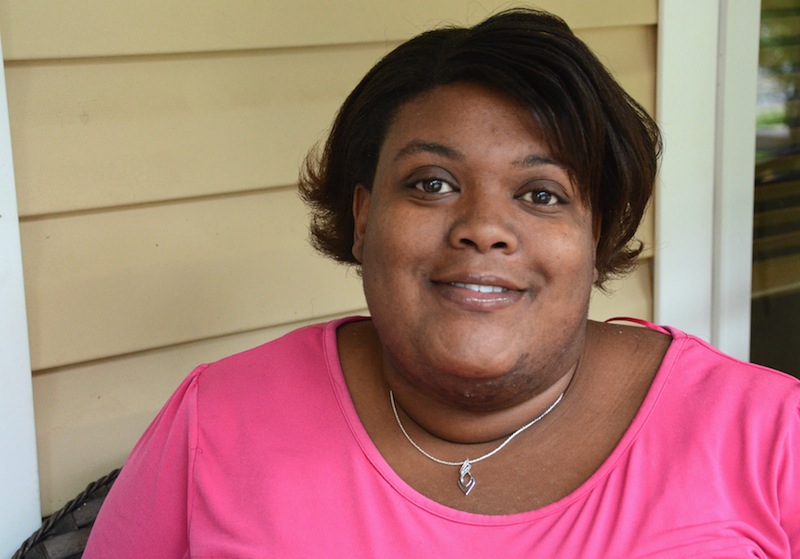Sharone Owen says her ex-husband was “creative,” at least in one way. “He made sure he wouldn’t leave any bruises outward,” she recalls. “He would do things that you couldn’t see with the naked eye.”
It started with verbal abuse, she says, and quickly escalated to physical violence. So when Owen came home one night to a dark house, closed blinds and her husband standing in the hallway with his hoodie up and a chain in one hand, she knew pain was headed her way. Within minutes, she says, he’d pinned her against the wall and begun choking her with the chain because she’d failed to answer his calls to her cellphone.
That was five years ago, and though the bruises are long gone, the memories remain. But what finally prompted Owen to drive herself and her three children to Helpmate’s emergency shelter was a question her doctor asked her: When you go home, do you feel safe?
Such conversations can be the first step toward escaping a dangerous situation.
“People are far more likely to disclose first to a caring professional, such as a doctor or clergy person, before they seek help,” notes Valerie Collins, executive director of Helpmate. The Asheville-based nonprofit is Buncombe County’s domestic-violence agency. “There’s an authority [there], and people trust their medical professionals. There’s also confidentiality and a level of comfort.”
Thanks to the Patient Protection and Affordable Care Act, most women can now have those conversations without having to worry about the cost. Effective Aug. 1, domestic-violence screening is one of eight free preventive services for women. The list also includes “well woman” visits, contraceptives and testing for the human papillomavirus. An additional 14 preventive services for women, such as mammograms for those over 40, were already free under the health care reform.
“I used to have women tell me all the time that they’d seen a physician or nurse and had obvious injuries but weren’t asked about it. That was in the very beginning; this new provision just speaks to how much better things have gotten,” says Deb Vingle, Helpmate’s program coordinator.
Owen could tell that her doctor knew something wasn’t right. That willingness to listen, she believes, enabled her to break her silence.
“I could have had a doctor that didn’t care about nothing, but he actually sat and paid attention to me. He saw that I wasn’t happy, that I was emotional about everything and really jittery. He saw certain things going on with me that I didn’t realize I was showing to other people. He saw those things, and he made sure that I didn’t leave without getting at least a phone number I could call for help,” she reveals.
Dr. Todd Wallenius, medical director at Western North Carolina Community Health Services, also stresses the importance of open communication and trust when discussing tough issues during routine screenings.
“Too often, victims of domestic violence don’t disclose their abuse because of fear and stigma,” he explains. “By asking questions about domestic violence, primary-care providers can not only identify patients in need but can also educate all patients about the risks — which may help reduce the stigma over time.”
In 2011, there were 73 known domestic homicides in North Carolina, according to the N.C. Coalition Against Domestic Violence. Another 39 have been recorded so far this year.
The night Owen left, she remembers, “He just said, ‘Shut up! I’m gonna kill you,’ and when he turned around, he had this weird look in his eye. Something just wasn’t right, and he said, ‘I’m going to start with the kids and end it with you.’” Once she got in the car, Owen found the card her doctor had given her.
Five years later, Owen and her three children are living in a house built by Habitat For Humanity. But despite the happy ending, Owen says those painful experiences have shaped who she is today. It’s one of the reasons she’s willing to share her story.
“I hope that if I can tell other people about what happened to me, that they can either get out of their situation or never get into one,” she explains.
As for her doctor, notes Owen, “To this day, he still makes sure everything is OK. It’s not just the usual doctor/patient relationship. It’s ‘How is everything going with you?’”
Need help?
If you or someone you know needs help, here are a couple of starting points:
Helpmate crisis line
828-254-0516
National Domestic Violence Hotline
1-800-799-7233
TTY 1-800-787-3224




Before you comment
The comments section is here to provide a platform for civil dialogue on the issues we face together as a local community. Xpress is committed to offering this platform for all voices, but when the tone of the discussion gets nasty or strays off topic, we believe many people choose not to participate. Xpress editors are determined to moderate comments to ensure a constructive interchange is maintained. All comments judged not to be in keeping with the spirit of civil discourse will be removed and repeat violators will be banned. See here for our terms of service. Thank you for being part of this effort to promote respectful discussion.